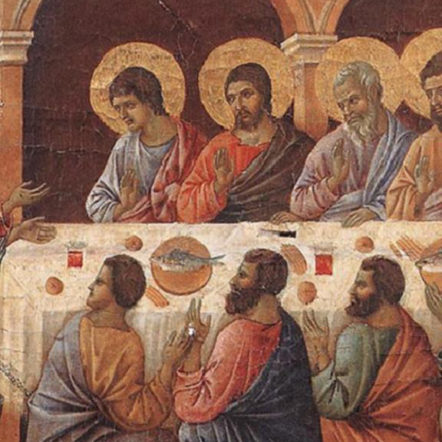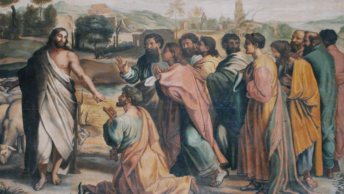People in economic straits learn to make do with less. But, it is much more difficult for those whose standards of living were elevated and have fallen on hard times. Our readings for the 15th Sunday in Ordinary Time, too, deal with hardships and sacrifices. They also tell us how to handle hardships and how to make sacrifices acceptable to the Lord.
Amos was doing ok. He had not one but two jobs. He was a shepherd and a sycamores’ dresser. But the Lord “yanked” him away from his decent and relatively comfortable life to become a prophet. Not just any prophet but a prophet sent to a most hostile audience influenced by the king of Israel and by Amaziah, the priest of the Sanctuary of Bethel. The end result was that this man gave up two jobs only to get criticism, hostility, insults and banishment in return.
In the gospel passage from St. Mark we have a similar request, although stretched out over a few years. The twelve had given up their jobs as fishermen, tax collectors, farmers and other professions to be with Jesus and be sent out, two by two, to preach not what people wanted to hear, but something as unpleasant as repentance. Here, too, being disciples of Jesus entailed sacrifices and hardships like having to travel without sack, money, or food; and not even a change of clothes. Furthermore, they had to face the possibility of being unwelcomed and have the door shut in their faces.
Last Sunday, we heard that St. Paul had a similar calling; yet he could write: “I am content with weaknesses, insults, hardships, persecutions, and constraints for the sake of the gospel.” The obvious conclusion is that, as disciples of Christ, as people called by our God, we might have to face a life of sacrifices, criticism, rejection and hardships, not to mention heartaches and anguish.
Here are some examples:
Grandparents having to raise also their children’s children, because of economic straits or cruel turn of events.
Widows and widowers, who have to fend for themselves on account of heartbreaking losses.
A serious, life-threatening illness that throws everyone in the family into a tailspin while making them feel mostly powerless.
An act of foolishness causing shame, confusion and anguish to all in the family.
The list goes on and on and it could include a special “assignment” from the Lord, a mission that had never crossed our mind as a possibility for us.
The longer we have lived on this earth the more the chances that the Lord might have called us to alter dramatically the course of our life. Therefore, we, especially if not young any more, must have concluded that no one should make detailed and precise plans for the future. As disciples of Jesus, none of us should, seriously, think of “retiring,” of “going away from it all,” or of counting on people close to us to be there for us.
Invariably, this thought creates a sense of uneasiness and insecurity. Besides taxes and death, is there anything else certain? Well, we are here, today, to remind each other that, precisely as true disciples, as genuine believers, we can count on the most certain reality there is: God’s unfailing, all-encompassing, free-of-all-strings attached love. This love was the reason why Amos could leave his two jobs and face criticism, hardships and banishment as a prophet. This love was the reason why St. Paul could embrace a life marred by all kinds of serious trials. And this was the love that prompted the twelve to leave everything behind and obey Jesus’ order to preach repentance.
We might all envision, already, the sacrifices, the hardships, the hard work that the Lord is asking us to make or to continue to make. We might also guess what we have to give up of the good, legitimate, well-deserved, fine things in life for a higher calling from the Lord. Hence, how do we keep motivating ourselves to live in new, unplanned circumstances?
We shall walk through this process of reasoning with St. Paul: “Blessed be the God and Father of our Lord Jesus Christ, who has blessed us in Christ with every spiritual blessing in the heavens, as he chose us in him, before the foundation of the world…”
How old is the world? The numbers are so staggering that we can miss the exact figure by a billion years or two. And how big or, rather, how small is the earth in the immensity of this ever-expanding universe? It is less than the smallest grain of sand by comparison. And how small am I on my tiny corner of this earth? And how many billions of people have lived, are living, and will live on this planet?
Well, before all this breathtaking magnificence, the Father chooses me, knows me, loves me and goes through the trouble of keeping the exact count of every single hair on my head. And, all within His infinite power, God offers me the ultimate proof that He loves me and that He won’t change His mind about His love for me: He allowed his only Son Jesus to die on a cross as if I was the only person on this earth. (cf. Galatians 2:20)
Hence, let us pause and think: the Almighty cannot top that, the ultimate sign of His love! Maybe for months, for years, for decades, we have been worried and complaining and wondering; and yet we must admit that we survived very serious, even potentially crippling trials. Somehow there has been always a way. His love is everlasting, unfailing, guaranteed. This should be enough reason for any of us to accept all the hardships, sacrifices and renunciations demanded of us, and go on living with unremitting trust and unquenchable hope.








